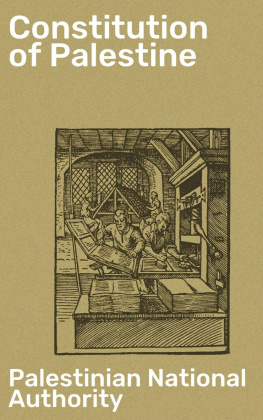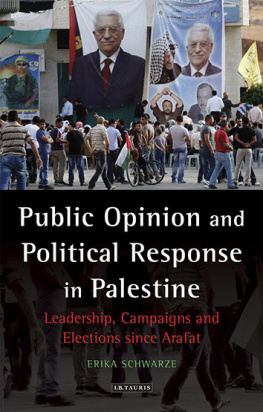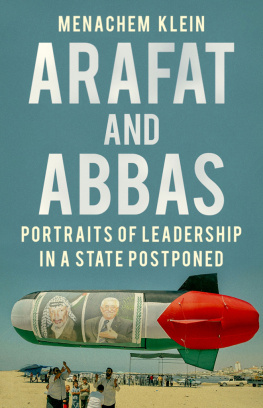Published by State University of New York Press, Albany
2022 State University of New York
All rights reserved
Printed in the United States of America
No part of this book may be used or reproduced in any manner whatsoever without written permission. No part of this book may be stored in a retrieval system or transmitted in any form or by any means including electronic, electrostatic, magnetic tape, mechanical, photocopying, recording, or otherwise without the prior permission in writing of the publisher.
For information, contact State University of New York Press, Albany, NY
www.sunypress.edu
Library of Congress Cataloging-in-Publication Data
Name: Hitman, Gadi, author.
Title: The Fatah-Hamas rift : an analysis of failed negotiations / by Gadi Hitman.
Description: Albany : State University of New York Press, [2022] | Includes bibliographical references and index.
Identifiers: ISBN 9781438487038 (hardcover : alk. paper) | ISBN 9781438487052 (ebook)
Further information is available at the Library of Congress.
10 9 8 7 6 5 4 3 2 1
To my beloved parents, Miriam and Yoske,
March 2021
Introduction
I n August 2020, during a global health epidemic, Israel and the United Arab Emirates announced cooperation, attempting to find a vaccine against the deadly virus. A few days later the two countries announced that they would sign a peace agreement between them. It was a visible move in the direction of trying to shape a new reality in the Middle East. The Abraham agreement was signed on September 14, 2020, between the two states at the White House, under the United States auspices.
The Israeli-Emirati political move provoked strong protest in the Palestinian system, with accusations against the Emirates of treason because the Palestinians had not yet fulfilled their vision of establishing an independent state. For the first time since 2013, representatives of all Palestinian organizations met and agreed to work together against the new agreement. This decision might have sounded like the beginning of a new friendship or at least a renewal of such a friendship, but it raised questions and doubts about the ability of the Palestinians to act together. This is mainly because there has been a political rift between the Palestinian Authority and Hamas since 2007, not to mention ideological disagreements that have been going on for decades.
The Israeli-Arab conflict, and within it the Israeli-Palestinian conflict, has been a constant topic of research writing for several decades. Despite significant changes in Israeli-Arab relations, the most notable of which are peace agreements with Egypt (1979) and Jordan (1994), and normative relations with other Arab states without signed agreements, the Palestinian question has not yet been resolved. For years, a leading perception among all those following developments in the Palestinian arena is that Israel is the most influential factor in this arena. It has exercised military rule in Judea and Samaria, also known as the West Bank, continuously since June 1967; it has established in these regions a broad settlement of half a million Jews; and it has overseen virtually uninterrupted security and settlement in these areas since June 1967. This was also the reality in the Gaza Strip before August 2005, when Israel unilaterally disengaged from that area and evacuated twenty-one settlements where some eight thousand Jews lived. Since then, Israeli influence on the Gaza Strip has continued through control of the crossing points between Gaza and Israel.
Even if we accept this description as historical fact, it cannot explain the geopolitical situation that has existed in the Palestinian arena since June 2007, when Hamas forcibly took control of the Gaza Strip. Since then, Palestinian society, which has common historical, legal, religious, and traditional roots, as well as a shared ethnic character, has been dividedgeographically, politically, and ideologically. Despite having a common national ethos, consisting of a dream of liberating Palestine (which is dominated by foreign rule, that is, by Israel), returning refugees to their homes, commemorating the martyrs, and freeing prisoners, the Palestinian system is split. The Palestinian Authority (hereinafter PA) controls the West Bank and Hamas is the dominant political power in the Gaza Strip.
This book asks why: Why has the Palestinian leadership and the central, major political forces failed to solve the ongoing rift between them? Why did nine rounds of negotiations from 2007 to 2017most with assistance from Arab mediatorsnot end with an accord accepted by both sides? In order to answer these questions, a comprehensive study requires examination of elements such as: theories about negotiations; negotiation as it is known in an Arab-Muslim culture; an examination of the Palestinian national ethos; and an analysis of the negotiation process between the parties, namely the Palestinian Authority (based on Fatah elements) and Hamas.
This book is mostly about the negotiations between the Palestinian Authority and Hamas from 2007 to 2017. Previous studies in the Palestinian arena did not discuss this issue, which has a significant impact on Palestinians. My main argument is that personal, sometimes also organizational, interests and a constant mutual lack of trust between the parties on national interests prevailed and negatively influenced the outcome of the negotiations. Moreover, I claim that both parties share a common national ethos, based on common history, language, customs, linkage to territory, Nakba memories, and feelings of victimhood; but over the years, the PA (dominated by the Fatah organization) and Hamas have developed different visions regarding the future of the Palestinian society.
The first chapter of the book focuses on theories relating to negotiation. The general assumption is that negotiations between rivals with different cultures are difficult, and that similar negotiations between rivals from the same culture are less complicated. Can people belonging to the same culture, with the same national ethos, more easily bridge gaps between themor is it precisely because of this cultural closeness that they can see the other side of the dialogue as a rival, despite sharing the same culture, making the possibility of agreement less likely? Are leaders from both parties really interested in reaching an agreement or do they lack the readiness and maturity to put personal interests aside, as well as ideological concepts of their movements interests? Since both parties are Muslim, I find it useful to discuss principles of dialogue within Islam alongside Western theories on negotiation. Basically, Western scholars suggest seven different variables in negotiation, and Islamic tradition adds five more components. The full list includes: (1) alternatives, (2) interests, (3) options, (4) legitimacy, (5) commitment, (6) communications, and (7) relationships. Muslim scholarship, which goes back to the days of Imam Ali, the fourth caliph in early Islam of the mid-seventh century (656661), adds five more attributes: (1) knowledge, (2) leadership and responsibility, (3) variables, (4) patience and consistency, and (5) justice.
The second chapter discusses elements of the Palestinian ethos, shared by both sides. Following that, the question is how the secular and religious streams fail to bridge the gaps between them and unite forces to maintain the ethos. Following this, I argue that the geopolitical split that has existed in the Palestinian system since 2007 has created two Palestinian communities that differ in terms of vision and identity. This split has sharpened both parties understanding that having political control within the Palestinian system is a prerequisite for resolving the Palestinian question (each side advocates a different solution). This necessity remains as a constant shadow in all rounds of negotiations between the Palestinian Authority and Hamas from February 2007 to October 2017. In fact, as of the completion of this book, it still prevents the two sides from resolving the rift between themdespite their shared Palestinian national ethos, which was developing throughout the twentieth century.









